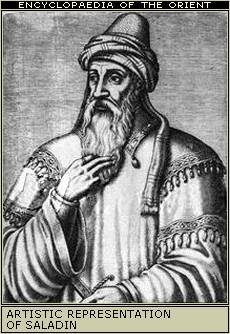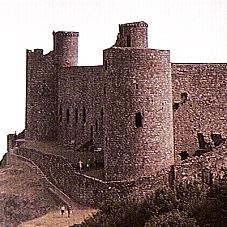 Born in Takrit, Iraq, in 1138, died in Damascus, in 1193, Saladin was the founder of the
ethnically Kurdish Ayyubid dynasty of Egypt and Syria and first Ayyubid sultan. He lived for ten
years in Damascus at the court of Seljuk soldier and statesman, Nur ad-Din, where Saladin
distinguished himself by his interest in Sunni theology. He accompanied his uncle, Shirkuh (or
Shirkoh), a lieutenant of Nur ad-Din, on campaigns (1164, 1167, 1168) against the Fatimid rulers
of Egypt. Shirkuh became vizier there and on his death (1169) was succeeded by Saladin. Saladin
later caused the name of the Shiite Fatimid caliph to be dropped from the Friday prayer, thus
deposing him.
Born in Takrit, Iraq, in 1138, died in Damascus, in 1193, Saladin was the founder of the
ethnically Kurdish Ayyubid dynasty of Egypt and Syria and first Ayyubid sultan. He lived for ten
years in Damascus at the court of Seljuk soldier and statesman, Nur ad-Din, where Saladin
distinguished himself by his interest in Sunni theology. He accompanied his uncle, Shirkuh (or
Shirkoh), a lieutenant of Nur ad-Din, on campaigns (1164, 1167, 1168) against the Fatimid rulers
of Egypt. Shirkuh became vizier there and on his death (1169) was succeeded by Saladin. Saladin
later caused the name of the Shiite Fatimid caliph to be dropped from the Friday prayer, thus
deposing him.
Saladin's first achievements were defending Egypt against Crusaders and abolishing the Fatimid caliphate in 1171 and restoring Sunni orthodoxy in Egypt, replacing the Shii orthodoxy brought by the Fatimids. (Saladin endowed Cairo with a college, a citadel and an aqueduct. Other Ayubbids restored Egypt to the Islamic learning and culture center it had been before the Seljuks. Ayyubids also brought the Mamluks, victors over the Mongols, into the country in large numbers.)

Saladin's fame reached its zenith, when he recaptured Jerusalem on October 1187 after 88 years of Crusader rule and successfully defended Jerusalem against the Third Crusade.
Despite his fierce opposition to the Christian powers, Saladin achieved a great reputation in Europe as a chivalrous knight, so much so that there was by the 14th century an epic poem about his exploits, and Dante, in his Divine Comedy, included Saladin among the virtuous pagan souls in The First Circle of Limbo (along with great pagan poets such as Homer, Horace and Virgil; great pagan philosophers such as Aristotle, Plato and Socrates; and Islamic scholars such as Avicenna and Averroës).
Saladin was of Kurdish heritage (even then despised by Turks and Arabs), and all through his
career he used mainly Kurdish officials as his closest partners. Saladin managed to revitalize
the economy of Egypt, he reorganized the military forces and with the advice of his father, he
stayed away from any conflicts with Nureddin, his formal lord, after Saladin had become the real
ruler over Egypt. Instead he waited until Nureddin's death, before he started serious military
actions first against smaller Muslim states, before directing it against the Crusaders. The
reputation that Saladin had among the Christians for generosity and chivalry does not seem to
have been a legend, and there seems no doubt that Saladin and Richard I of England admired each
other as worthy opponents. Saladin is one of very few personages of the time of the Crusades who
is positively described in both Western and Eastern sources. With his high position among his
Western opponents, he has become a figure that has fascinated Western writers.
- 1138: Born in Tikrit in Iraq as son of the Kurdish chief Ayyub.
- 1152: Starts to work in the service of the Syrian ruler, Nureddin.
- 1164: He starts to show his military and strategical qualities under 3 campaigns against the Crusaders who were established in Palestine, with the first campaign this year.
- 1169: Saladin serves as second to the commander in chief of the Syrian army, his uncle Shirkuh. Shirkuh became vizier of Egypt, but died after only 2 months. Saladin then took over as vizier. Despite the nominal limitations to the vizier position, Saladin showed little regard for the interests of his superiors, the Fatimid rulers. He turned Cairo into an Ayyubid power base, where he used Kurds in leading positions.
- 1171: Saladin suppresses the Fatimid rulers of Egypt in 1171, whereupon he unites Egypt with the Abbasid Caliphate. But was not as eager as Nureddin to go to war against the Crusaders, and relations between him and Nureddin became very difficult.
- 1174: Nureddin dies, and Saladin uses the opportunity to extend his power base. Conquers Damascus.
- 1175: The Syrian Assassin leader Rashideddin's men made two attempts on the life of Saladin, the leader of the Ayyubids. The second time, the Assassin came so close that wounds were infliceted upon Saladin.
- 1176: Saladin besieges the fortress of Masyaf, the stronghold of Rashideddin. After some weeks, Saladin suddenly withdraws, and leaves the Assassins in peace for the rest of his life. It is believed that he was exposed to a threat of having his entire family murdered.
- 1183: Conquers the important north-Syrian city of Aleppo.
- 1186: Conquers Mosul in northern Iraq.
- 1187: With his new strength he attacks the Latin Kingdom of Jerusalem, and after 3 months of fighting he gets control over the city.
- 1189: A third Crusade manages to enlarge the coastal area of Palestine, while Jerusalem remains under Saladin's control.
- 1192: With The Peace of Ramla armistice agreement with King Richard I of England, the whole coast, in a narrow strip from Tyre to Yaffo, was defined as Christian land, while the city of Jerusalem remained under Muslim control.
- 1193: March 4: Dies in Damascus after a short illness.
Here is what American children are taught about Saladin at the American Community School, Amman. Jordan, affiliated with The U. S. State Dept. Overseas Schools Advisory Council (www.acsamman.edu.jo/~ms/saladin/salhis.html, including a file of Saladin's journals; in the associated site, www.acsamman.edu.jo/~ms/saladin/saldin.html, students can "build castles" and play "Crusader"):
"About Saladin: Not too many people know what Saladin looked like. Most sources say that he was small, with a short, neat beard and somewhat frail. He was a excellent listener. His normally expressionless face would light-up when spoken to. This made the speaker feel comfortable and could speak very easily. You can see how vital this characteristic would be if you had to negotiate with the Crusaders who really didn't want to negotiate in the first place. It was also seemingly a miracle that Saladin would negotiate with "infidels" (as the Muslims called them) in the first place!
"Another characteristic that was considered shocking was how compassionate he was. He cried in front of his own advisors when he heard of his nephew's death! This may not seem like so much today, but back then a Sultan never cried in front of anyone. Including himself.
American studenst are told that one "shocking" thing about Saladin was "how modest he was. He even took orders from his own servants."
According to The French Writer Rene Grousse:"It is equally true that his generosity, his piety, devoid of fanaticism, that flower of liberality and courtesy which had been the model of our old chroniclers, won him no less popularity in Frankish Syria than in the lands of Islam", Renee Grousse, The Epic of the Crusades, Orion Press 1970, Translated from the French by Noel Lindsay.